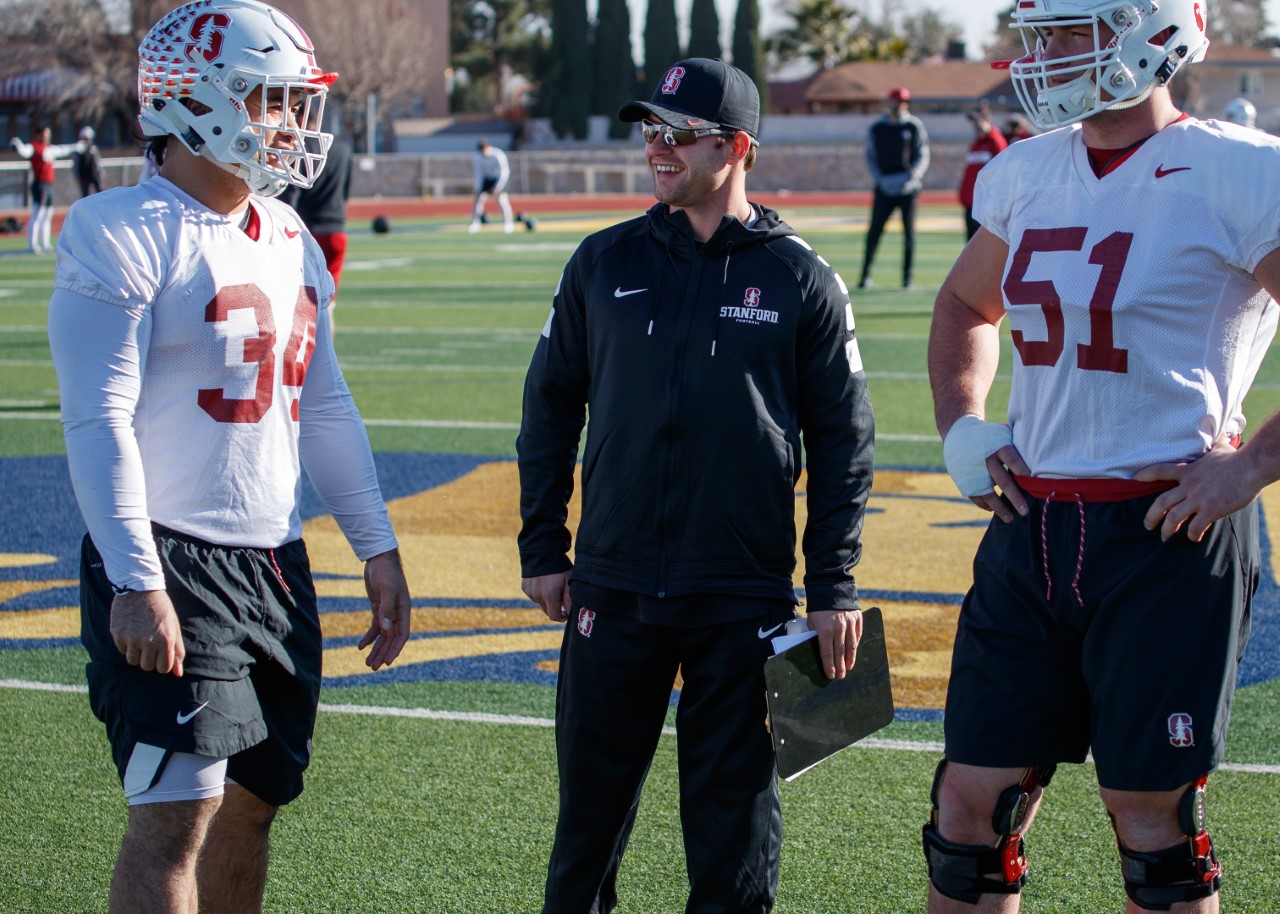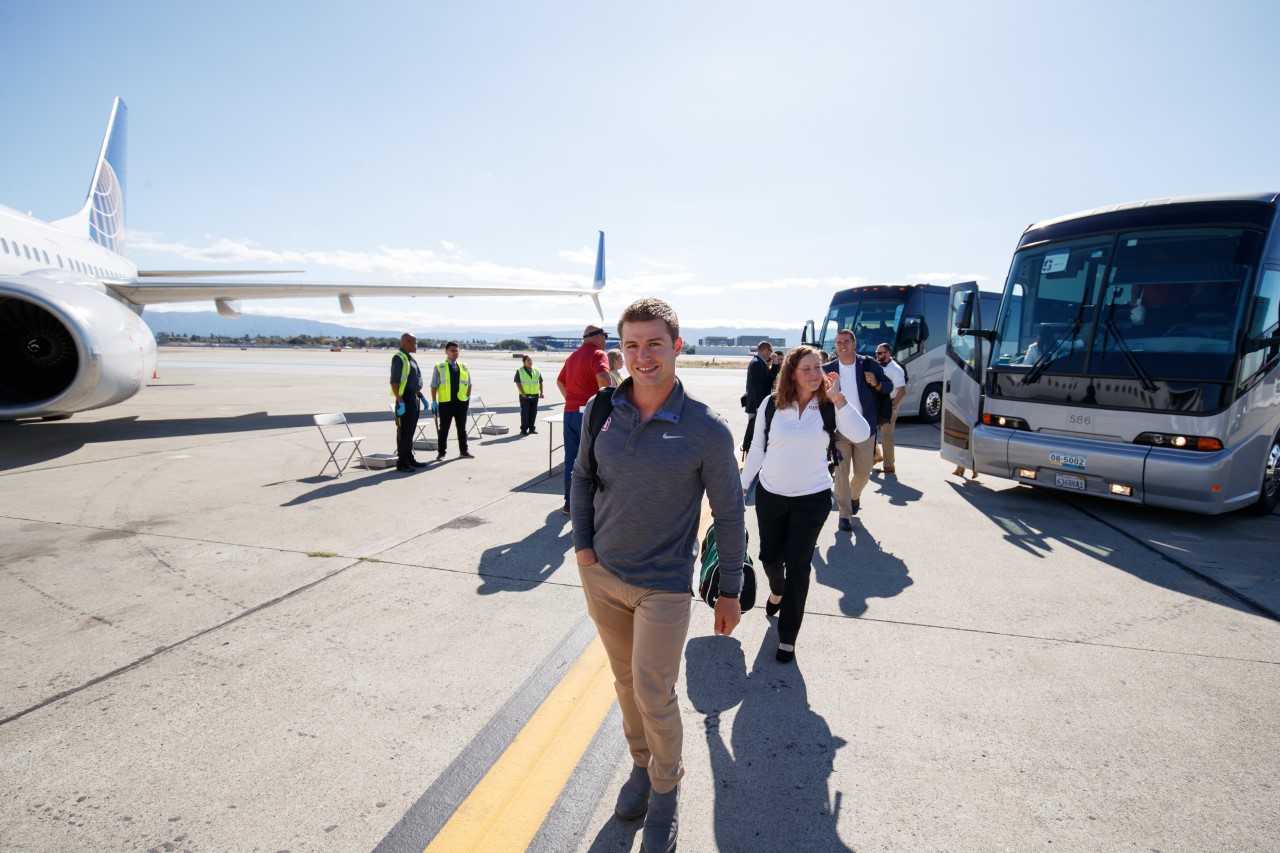With high risk comes high reward: the incredible journey of Matt Moran ’10
December 4, 2020
 Courtesy of Matt Moran
Courtesy of Matt MoranFrom the snowy streets of Brunswick to the sunshine of the Bay Area, Matt Moran ’10 has found his journey to the Golden State, one not traveled by many. Once a key player on Bowdoin’s football team, Moran is the Special Teams coordinator at one of the biggest football programs in the country: Stanford University’s Pacific-12 Conference (Pac-12) powerhouse.
Moran’s coaching career began as a volunteer coach for the Polar Bears when he realized he was not ready to step away from the sport he loved after graduating.
“I’d say it was the relationships formed through the football program, that when I was done playing, I wasn’t quite ready to give it up,” Moran said in a Zoom interview with the Orient. “I stayed on right after I graduated, and I volunteered as a coach at Bowdoin.”
In that first year, Moran balanced coaching with his job as a special education teacher at a local school in Lewiston. But after a second cold season at Bowdoin, Moran packed up his things and headed to the warm beaches in San Diego. While working as a high school football coach in the San Diego area, Moran applied to be a volunteer coach at the University of San Diego. After getting that job, his main tasks were simple: plugging numbers into a computer.
“That’s how you get into college football. If you didn’t play at a big program like Ohio State or Notre Dame or Stanford or wherever, you have to start and just say ‘hey, do you need somebody to come in and just enter stuff into the computer or do you need me to run copies or do you need me to do this?’” Moran said. “You start there, so I did that at the University of San Diego.”
The University of San Diego exposed Moran to experienced college coaches who shared their knowledge on how to further pursue a career in the football world. One way to progress, these coaches advised Moran, was to travel to the National Coaching Convention (NCC) held in Nashville, Tennessee.
“They basically told me, put a tie on, have your resume printed up and ready, and just shake as many hands as you can and walk around the lobby and just introduce yourself to people,” Moran said. “I didn’t know a soul.”
Spontaneity became common in Moran’s journey, and the trip to the NCC ended successfully—he was offered a job at Albright College, a small college in eastern Pennsylvania.
“I’m living in San Diego, [then] I’m in Nashville staying in a Motel 6 because I’m broke. I have no money. And after a six-hour interview they offered me the running backs coach and assistant special team coordinator job at this tiny little school in Pennsylvania,” Moran said. “But they told me ‘you start in four days,’ so I had to go back to San Diego, pack up my whole life, and then move to a place I had never been in rural eastern Pennsylvania.”
 Courtesy of Matt Moran
Courtesy of Matt MoranAlbright College challenged Moran’s work ethic, demanding nearly 100 hours a week from the start of training camp in August until the end of the season in December. Following two seasons at Albright, Moran began coaching at his first Division I (DI) school, Rutgers University.
“There is, for the entry level coaching position at the DI level, a graduate assistant. They just finished their playing career at, let’s just pick Stanford, and they decide they want to coach, so they enroll in a graduate program and coach for two years,” Moran said. “Those jobs are very hard to come by. You’re allowed four of them on a staff, and it’s usually young guys who are trying to decide if they want to coach, not guys like me who at that age [27] are trying to figure out how to continue to climb the coaching ladder.”
Moran heard this option was unpopular, so he applied to universities with highly competitive DI football programs. He got into Stanford University’s Liberal Arts Master’s Degree program and immediately reached out to the coaches.
“I volunteered to work a camp there, and I just ran around for three days like my hair was on fire just coaching everybody and anything,” Moran said. “Like, ‘You need water? You need this? You need me to get a bag? What do you need, coach?’ By the end of the three days, they offered me a job.”
That was six seasons ago. After two years, Moran was offered a full-time position on the coaching staff as the special teams quality control analyst, and he has maintained that position ever since.
No matter how far away he is, Moran still cherishes Bowdoin—whether it is through his times in Brunswick or his bike down Stanford’s longest street on campus, Bowdoin Street.
“It has been the relationships I’ve had with the people at Bowdoin. That is the reason why I was able to go 3,000 miles across the country to where I am now,” Moran said. “I am grateful for that, and I’ll pass on a little advice: it is all about the relationships.”

Comments
Before submitting a comment, please review our comment policy. Some key points from the policy: